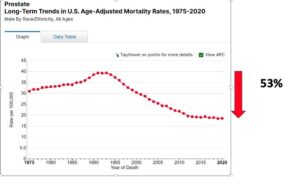Prostate Cancer Statistics – 2024
 Prostate cancer incidence increased by 3% annually from 2014-2019 after two decades of decline, translating to an additional 99,000 new cases.
Prostate cancer incidence increased by 3% annually from 2014-2019 after two decades of decline, translating to an additional 99,000 new cases.
Future progress in reducing prostate cancer-specific mortality may be curtailed by the rising incidence of prostate cancer which also happens to have among the largest racial disparities in mortality.
Black men have rates of prostate cancer 68% higher than their White counterparts whose rates are approximately twice those of Asian and Hispanic men.
The incidence of prostate cancer dropped by almost 40% from 2007- 2014 because of declines in the rate of localized tumors diagnosed through PSA testing, which decreased after the United States Preventive Services Task Force (USPSTF) recommended against screening for men aged 75 years and older in 2008 and for all men (temporarily from 2012 to 2018) to reduce the possible harms from overdiagnosis and overtreatment. Since 2014, incidence rates have risen
by 3% per year, mostly driven by 4%-5% per year increases for regional- and distant-stage diagnoses that began as early as 2011.
Localized-stage disease also increased from 73.5 per 100,0000 in 2014 to 84.8 per 100,000 in 2019, although this trend is not yet statistically significant. A recent study estimated that more than one-half of men in the United States living with metastatic prostate cancer were initially diagnosed with localized or regional stage disease.
Prostate cancer mortality rates were stable from 2013-2021 after declining by almost 3%-4% annually since the mid-1990’s, likely reflecting the uptick in advanced-state diagnoses over the past decade when the USPSTF recommendations against all PSA screening were in effect.
Prostate cancer mortality has declined by 53% since the peak in 1993, largely because of earlier detection through widespread screening with the PSA test to a lesser extent due to advances in treatment.
CA Cancer J Clin. 2024 Jan-Feb;74(1):12-49. doi: 10.3322/caac.21820. Epub 2024 Jan 17
SEER* Explorer Application (cancer.gov)
















